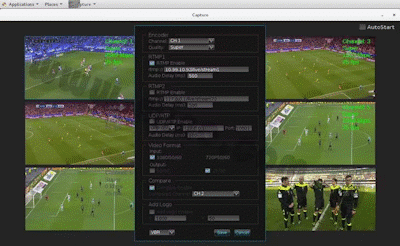 Filed in the Southern District of Texas, Nagravision’s complaint alleged that Gotech International Technology Limited and Zhuhai Gotech Intelligent Technology Company Limited, were the operators of an illegal online network that facilitated TV piracy online.
Filed in the Southern District of Texas, Nagravision’s complaint alleged that Gotech International Technology Limited and Zhuhai Gotech Intelligent Technology Company Limited, were the operators of an illegal online network that facilitated TV piracy online.
Nagravision alleged that the network captured and then rebroadcast decryption keys, allowing users to circumvent the company’s anti-piracy technology and watch its clients’ TV shows, without paying them a penny. Nagravision alleged violations of the Digital Millennium Copyright Act (DMCA) and the Federal Communications Act (FCA), which continue to feature in more recent IPTV piracy lawsuits filed alongside partner DISH.
The Same But Critical
The lawsuit against the Chinese companies claimed they had stolen/copied and then defeated Nagravision’s security technology, including watermarks used to track the original source of pirate broadcasts.
On paper, the case had everything; stolen anti-piracy tech deployed on servers in the United States, used to undermine both the owner of the tech and its customers, before pilfering their premium content and making it harder to track.
When the companies and a Hong Kong-based affiliate failed to defend, Nagravision was gifted a relatively easy win. A default judgment and damages award of $101,851,800, was widely reported alongside a permanent injunction, and a seizure order which included the defendants’ website.
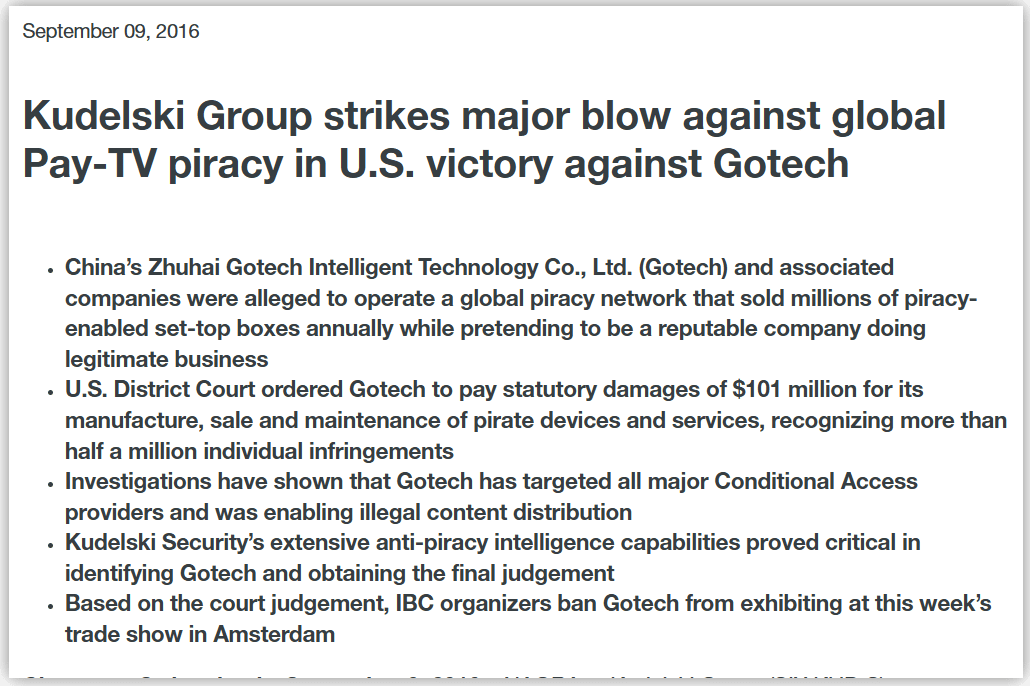
The defendants’ belated appearance saw the judgment upheld on appeal to the Fifth Circuit and Supreme Court.
In the wake of GoTech’s apparent defeat, mainstream interest in the case faded away. A notable case, of course, but the $101m ‘surprise’ had already been and gone. This was a copyright lawsuit after all, not unexpected competition for the last few minutes of The Usual Suspects.
So why are rightsholders still complaining about the same issues almost a decade later?
beIN and AVIA Bemoan GoTech’s Tech
In its recent submission for the USTR’s Special 301 Report, anti-piracy group AVIA outlines China’s lack of progress in tackling many aspects of online piracy. Issues that continue to affect the legitimate video market include hardware and software services allegedly operated by crime syndicates in China, AVIA notes.
Examples include “internet key sharing” (IKS) infrastructure targeting conditional access satellite broadcasts, and consumer use of pirate set-top boxes making use of shared keys to avoid paying for a legitimate subscription. AVIA highlights a familiar company as a significant player in the IKS market.
“One such enterprise, Zhuhai GoTech Intelligent Technology Company Ltd., was unmasked in a 2016 civil suit in Texas and a significant monetary penalty awarded; however the Chinese piracy syndicate that owns GoTech has been undeterred by that judgment – it continues to quite publicly offer – from its base in China – IKS piracy services on its international social media pages, under various brand names,” AVIA informs the USTR.
Another troublesome GoTech product may also sound familiar. Capable of identifying hidden security markers present in legal video streams, MKTech-branded GoTech encoders can render such codes useless. In the wrong hands, the source of subsequent pirate broadcasts or streams can become harder or even impossible to identify and shut down.

AVIA doesn’t mention a specific model number but does mention MKTech-branding. Since they’re not exactly top secret, images of a likely candidate and its sales pitch (but not the model number) are shown above.
“As watermarking is a technology implemented by content owners to aid in detection and termination of pirate video streams, it is patently clear that a watermark removal function is aimed at undermining the interests of legitimate content suppliers and content owners alike,” AVIA continues.
“There is no legitimate reason to remove watermarking from video; in marketing these capabilities, the Chinese manufacturers are providing essential technical capabilities for pirates around the world.” A submission by beIN and Miramax continues on similar lines.
How the devices are able to detect the otherwise invisible watermarks is explained in basic terms on the seller’s website; it compares signals from two set-top boxes and detects differences in the output. It sounds almost too easy but if the rightsholders say it’s a problem, it probably is.
That said, marketing for the encoder does reveal similar functionality that doesn’t involve removing watermarks. For those who happen to have a logo baked into ‘their’ legal streams but for some reason need to switch to a different one, the MKTech encoder can handle that on the fly.
Isn’t a $101m Judgment Supposed to Act as a Deterrent?
As the screenshot from a company marketing video reveals, GoTech’s innovation in this field has been acknowledged with almost “100 independent intellectual property and patents.[sic]”
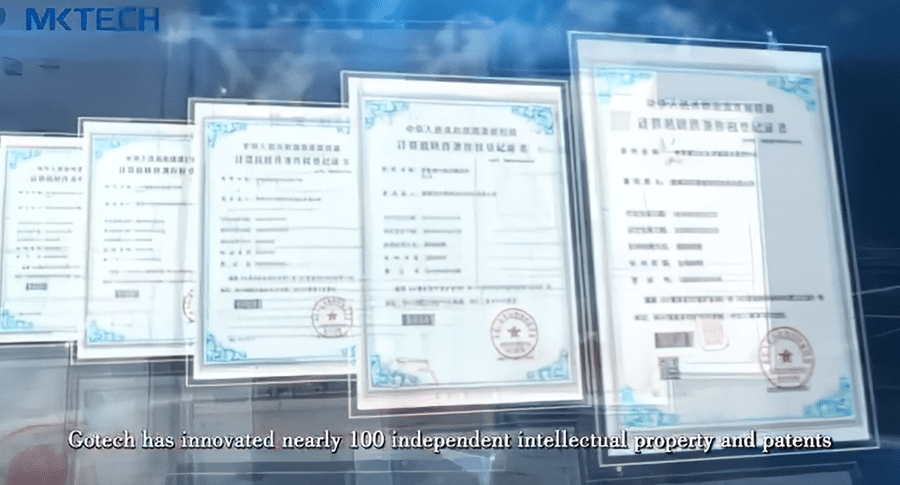
Yet in light of comments made by AVIA, beIN and Miramax, recognition of valuable IP rights seems to meet challenges. Did the $101m judgment carry no weight? Was the loss of a critical domain name simply brushed off as meaningless, even as part of a deliberately punishing injunction?
Having conceded that answers may only exist in Chinese, finding out what happened was surprisingly easy. Zhuhai Gotech Intelligent Technology Co., Ltd produces highly detailed reports on the company’s activities. The lawsuit in the U.S. appears in several reports; as far as we can tell, the main aim was to keep those with an interest or potential interest in the company up to date on developments.
Declarations in the reports appear to be no more biased than one would typically expect from a party in a lawsuit; the core issues are mostly stated matter-of-fact. The dispute goes far deeper than coverage here suggests, but suffice to say the sudden appearance of a threat to the whole world, meant that 2020 was no ordinary year.
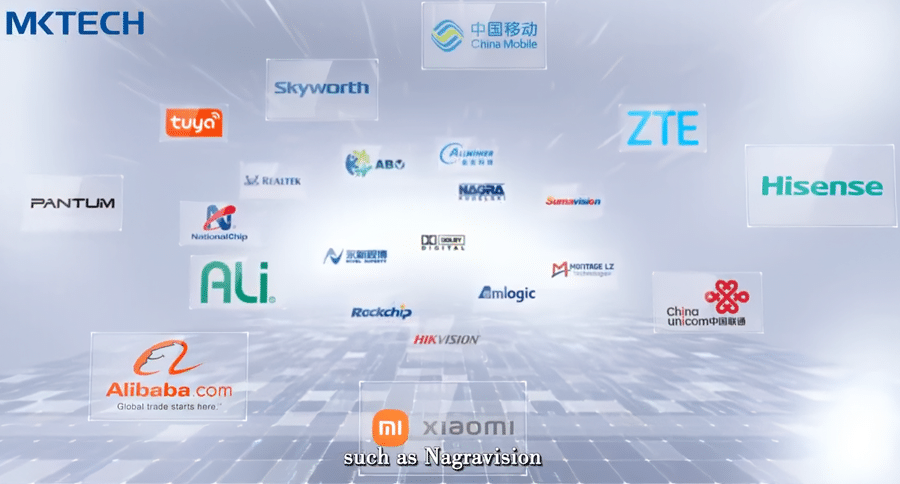
A Zhuhai Gotech report notes that the coronovirus pandemic disrupted hearings in the case; regardless of who was to blame, mention of a hearing led to apparent acceptance things had gone in the wrong direction. At this point the company went into significant detail explaining why a foreign case had almost no chance of being enforced in China, but wasn’t ruling it out.
“The company cannot reliably estimate whether the above litigation case may result in losses and the amount of likely losses, so it has not recognized estimated liabilities and possible losses.”
The $101m Judgment That Never Was
In an order handed down in January 2022, a district court judge in Texas vacated the final default judgment handed down by his own court in 2016. After also vacating a contempt order and all monetary fines, the judge dismissed the case against Zhuhai Gotech with prejudice, meaning it could never see the light of day again.
Confirmation of a settlement appears in a GoTech report, available in even greater detail here (pdf).
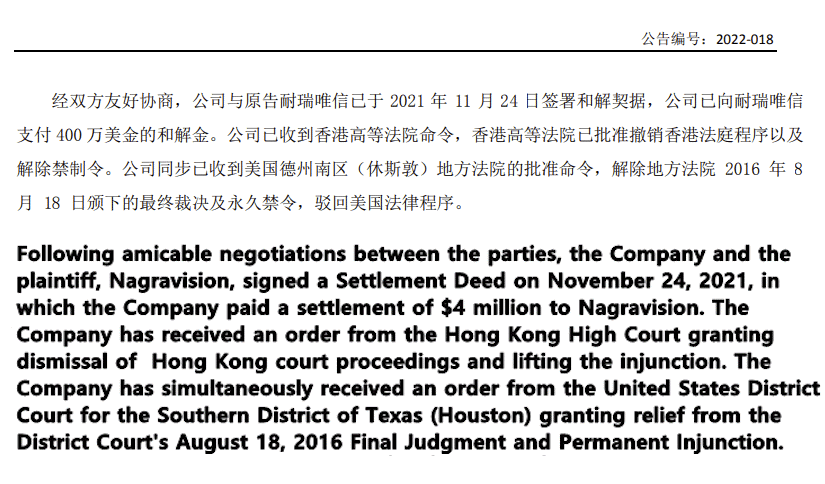
Whether COVID-19 played a small or significant part in the decision to settle is unclear. Yet against the odds, while most of the rest of the world descended into chaos, sometimes verging on madness, pirates and pirate chasers were able to see past industrial scale piracy allegations and appreciate the finer things in life.
Not just $4 million in hard cash but also something much more precious.
The full terms of settlement are unknown to us, but the video below indicates that GoTech now views Nagra as a valuable partner. Despite having dozens of other companies it could’ve chosen to put first in its glossy promo video, it didn’t.
The details of the case in the context of complaints made to the USTR may need some dramatic license to rival the big reveal at the end of The Usual Suspects.
That said, making a $101m judgment disappear wasn’t just the greatest trick, it was remarkable for its ability to definitely exist while at once never actually existing at all. A shout-out to Nagra, meanwhile, absolutely exists around five minutes into the video below.
From: TF, for the latest news on copyright battles, piracy and more.
Powered by WPeMatico
